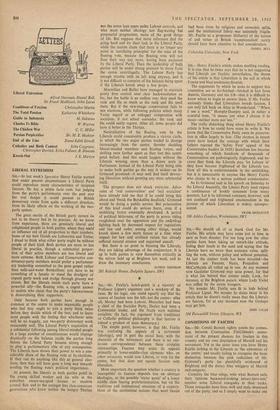SIR,—Mr. Fairlie's hotch-potch is a travesty of Professor Lipset's argument
and a mockery of the issue. By his logic, one could equally say that the source of fascism was the left, not the centre: after all, Mosley had been Labour, Mussolini had been a chief of the Socialist Party, Doriot had been a Communist leader, and the Nazis were national socialists. (In fact, the argument from traditional or Catholic political philosophy is that fascism is indeed a product of mass democracy.)
The simple point, however, is that Mr. Fairlie was confusing the appeals of a movement (ideology), and in part the social base, with the character of the movement; and there is no one- to-one correspondence between these complex relationships. Fascism may make its appeals primarily to lower-middle-class elements who, on other occasions, would vote Liberal, or vote for the centre, but that does not equate fascism with liberalism.
More important, the question whether a country is 'susceptible' to fascism depends less on abstract ideologies, or the possible 'status panic' of a lower middle class fearing proletarianisation, but on the traditions and institutional structure of a country. Most of the continental nations that went fascist had been riven by religious and economic splits, and the institutional fabric was extremely fragile. Mr. Fairlie as a proponent (hitherto) of the nature of and virtue of British 'exceptionalism' surely should have been attentive to that consideration.
*






































 Previous page
Previous page